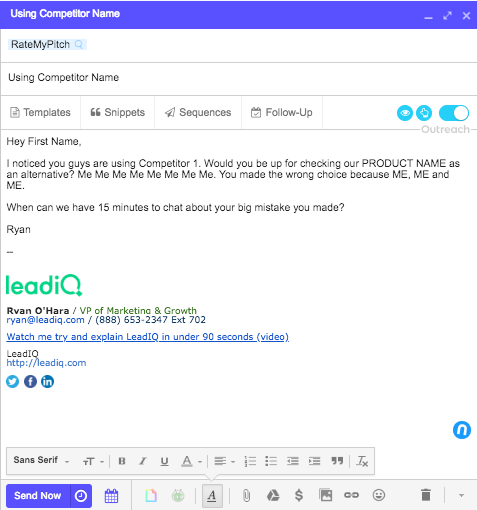Ready to create more pipeline?
Get a demo and discover why thousands of SDR and Sales teams trust LeadIQ to help them build pipeline confidently.





Get a demo and discover why thousands of SDR and Sales teams trust LeadIQ to help them build pipeline confidently.
Every sales professional will eventually experience the so-close-yet-not-quite feeling that occurs when finding a prime target contact that is already committed to a competitor.
The good news is that this scenario doesn't necessarily spell out the end of the road for that relationship. It’s possible that the prospect’s contract is almost up, and they are reevaluating their commitment. Or perhaps they are unhappy with their current services and are open to exploring their options. These possibilities are only two examples of how you can still win over a prospect that currently works with someone else.
The truth is that convincing a competitor's clients to switch services is a common practice among B2B and SaaS companies. A typical part of B2B Demand Generation strategy is to find who is using your competitor's or complimenting products and services. Then, using account-based marketing (ABM), work on showcasing why those customers should switch.
This competitive approach is a fundamental part of doing business—one that can drive companies to improve products and services in hopes of winning over the customer.
One of the best parts about selling to a competitor's customer is that, for the most part, they already understand the value of what you’re trying to sell. But that bonus alone won’t win you a new client. Your initial outreach shouldn’t focus on comparing yourself to a competitor and making it clear why you’re the better option. Instead, you will still need to focus the conversation on your prospect and their needs.
Turning your competitor’s customer into your own is a tough job, and requires a strong strategy to match. To pull it off, you will need to first capture the prospect’s attention, then prove why your products and/or services are worth the investment.
Any cold email should always focus on the prospect and what makes them special to you. When reaching out to a competitor’s customer, you will need to hyper-emphasize this quality. Do not make the email about you — emails that focus just on your company's product or service lack personalization, and only work 3.5% of the time.
Instead, focus on a problem the prospect may or may not be aware of having. Doing so demonstrates that you are reaching out for the prospect’s benefit, not your own. This approach will increase the chances of receiving a response from an interested and engaged prospect.
Do some research before reaching out to a prospect. This process can start by asking and answering questions such as: what is the competition currently offering? What is trending in that customer base’s likes and dislikes? Can you solve the problem faster?
With social media and online tools, it has never been easier to uncover how customers feel about the tools or services they use. Check out online review sites such as LinkedIn, Reddit, G2 Crowd, Yelp, and even Facebook groups, to get first-hand reviews and feedback on your competitors. Conducting internal research is also beneficial. See if you can run a survey on your own customers to gain a deeper understanding of why they picked you over the competition.
One of the primary goals of this research is to understand what makes you different: ideally, in a way that sets your company one step ahead of the rest. You need to ensure this difference is something your customers want and have a plan on how to showcase this to them.
Ironically, a lot of companies go about innovating and solving problems customers don’t need to solve. It makes little sense, for example, to develop the world’s fastest smartphone when what your customers really want is longer battery life. Find out what problem your prospect is facing and be the best solution to that problem.
Providing prospects with valuable information or content is a major way to build the relationship and gain trust. You are not asking anything in return from the prospect; you’re simply trying to support them.
Even though your prospect may not need your product or service at the moment, you may be exactly what they’re looking for in months to come. Consistently building a relationship with them by sharing helpful content ensures that you’ll always be in the back of their mind when the time comes to reevaluate their needs.
Sharing content is one of the best ways to provide value. Content on LinkedIn, a podcast, or an article are all relevant mediums, as long as they speak to the prospect’s industry or pain point.
Before you send that email, ask yourself, “Have I proven how I can provide value to their priorities? Why would they respond to this email?” If you can’t answer those questions, don’t send the email.
“When looking to secure meetings with customers of your competitors it's important to provide value with every message so that you can build trust with them. You don't know when their contract is up for renewal, or whether they're even aware of your solution. Competitor plays can take some time to build upon, which is why relationship building is crucial.”
- David Dember, Team Lead, Enterprise Sales Development at Sendoso
Proving to your customers' competitors that you’re worth the investment does not mean that you should list off your strengths and your competitor’s weaknesses. Stay classy when mentioning competitors, and shift the focus to treating each prospect with respect and an emphasis on building the relationship, instead of bad-mouthing their current provider.
Talking about yourself too much in a cold pitch comes off as insensitive and tone-deaf to your prospect’s needs. Instead, focus on why this prospect is special to you, and how you are suited to meet their unique needs.
If you’re cold calling the prospect, avoid jumping into a five-minute pitch on what your company does. You need to focus on the prospect and let them do most of the talking. Listen to what they are saying. Uncover what their pain points are.

The email above is what you should NOT be doing. Avoid “me first” emails at all costs.
One approach is even though you know that a customer uses your competitor, hold off on telling them you know it as the first step in your outreach. Wait for them to tell you or save it as an email or call later on in a cadence. Have a plan of execution before reaching out to prospects.
Nobody wants an unsolicited email bragging about what your company can do that their current provider cannot. When prospecting your competitors' customers, let them conclude that your product or service should replace your competitor: do not tell them that directly. Imply things without pointing out flaws in your competition. Focus on your company’s strengths as they relate to the prospect.
Remember, you haven’t established trust yet. This means you must focus on building the relationship in order for them to even think about turning to your product/service. Avoid looking selfish while prospecting your competitors and come away looking like someone who sincerely cares about the prospect.
When prospecting any individual, the goal of your first cold email or cold call should never be to book a meeting. This rule also applies to talking to competitor’s customers. Asking to hop on a call and schedule meeting time will almost certainly be met with a non-response or “no.” Avoid coming off as pushy or obnoxious.
Instead, focus on building the relationship and providing the prospect with value. Discover a problem they're facing and follow up with content that helps address that problem. Provide insight. Your goal with every outreach is for the prospect to gain something from reading your email or answering your call. If you start off without providing value, they’re going to ignore your outreach moving forward.
Interacting with your competitor’s customers is intimidating. But as long as you remember that competition is the name of the game in sales, and to take the high road when talking about your competitor, you may find the process invigorating, instructive, and hopefully—by following the guidelines listed here—a rewarding challenge.
Subscribe for updates.